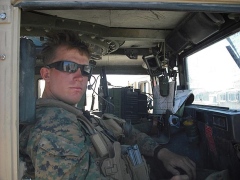MOH recipient Meyer says hero status doesn't change his identity

View Gallery (4 images)
WASHINGTON — Dakota Meyer doesn’t mind if people call him a hero. He doesn’t really believe it, but he’ll accept the compliment graciously.
“It doesn’t make me feel uncomfortable, but it doesn’t change who I am either,” the 23-year-old Marine Corps veteran said in an interview with Stars and Stripes. “I know who I am, and I know why I did what I did.”
What Meyer did was battle dozens of enemy fighters on a remote mountainside in Afghanistan, risking his life repeatedly in an effort to save four fellow servicemembers pinned down in an ambush. Five times he ventured into direct enemy fire in an effort to reach the men, defying orders to stay put in a safer position.
“I didn’t think I was going to die, I knew I was,” he said. “But it didn’t matter. Those guys are going to die without you, so you either get them out alive or you die trying.”
On Thursday, the White House will honor Meyer with the Medal of Honor, the nation’s highest military award for valor. He is only the third living servicemember from the Afghanistan War to receive the award, and the first living Marine to be given the honor for battlefield heroics since the Vietnam War.
But Meyer said the honor is bittersweet, because his efforts weren’t enough to save the four U.S. troops and nine Afghan soldiers. Even after leaving the military and going into construction work, Meyer said the attack is still painful and emotional for him to discuss.
Military officials have acknowledged significant mistakes in the mission planning and response, and later reprimanded three unnamed officers for a “lack of situational awareness and decisive action.” The September 2009 mission in Ganjgal Valley was supposed to be a straightforward meeting with local elders, but the delegation of Marines was ambushed by dozens of enemy fighters just outside of the village.
The Marines were broken up among four different units in the valley, each working with local Afghan Security Forces as part of a larger embedded training mission. The Marines closest to the village were bombarded with gunfire and mortars immediately. Meyer, then a corporal, and then-Staff Sgt. Juan Rodriguez-Chavez were positioned with Humvees hundreds of yards up the mountainside when the attack began. Seeing the carnage below, Meyer’s group called for air support multiple times, but were denied. Within minutes, Meyer and the other backup troops lost radio contact with the Marines in the village.
Commanders off-scene told the men not to engage with the vehicles, fearing civilian casualties and additional battlefield chaos. But Meyer said they went in anyway. With Rodriguez-Chavez driving and Meyer manning the turret, the pair made repeated trips into the battlefield, picking up wounded troops and trying to thin out the heavy enemy fire.
According to battlefield reports, the men would drive up beside friendly troops, position the vehicle to sheild them from gunfire, then speed back up the mountain to drop them in safer positions. Meyer several times abandoned the turret to drag injured colleagues into the Humvees, exposing himself to even more danger. The blast from a rocket-propelled grenade ripped open a gash on his arm, but he fought through the injury.
But they could not locate the Marines first hit in the assault.
Marine Corps officials said that during one run, Rodriguez-Chavez warned Meyer that their heavy Humvee might get caught in the mud, leaving them sitting ducks.
Meyer’s response: “I guess we’ll die with them.” The two men pushed on.
On their fifth trip back down the mountainside, this time joined by two more U.S. troops, they located the missing team. All four had been killed, and insurgents had already taken some equipment from the bodies.
Corps officials said that, despite continued heavy fire, Meyer and Army Capt. William Swenson carried the bodies off the battlefield to keep them from falling into insurgent hands.
In the end, Marine officials credit Meyer and his teammates with saving the lives of 13 Marines and 23 Afghan soldiers. Two other Marines — Capt. Ademola Fabayo and Rodriguez-Chavez — each received a Navy Cross for their heroism. Meyer alone killed at least eight enemy fighters, and his bravery in engaging and distracting the attackers undoubtedly prevented a larger tragedy.
But Meyer said he’s still haunted by the men he couldn’t save.
“[The Medal of Honor] isn’t for me, it’s for the guys who died,” he said. “There was a lot of emotion the day I found out I was getting it, and there was a huge price paid for it.”
Twitter: @LeoShane










